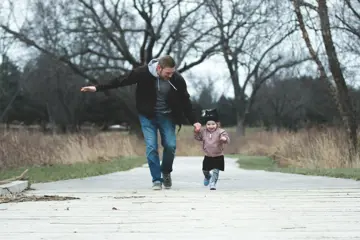In approved or formal kinship care (also known as 'family and friends' or 'connected person' foster care), the local authority will ask a relative or friend to care for a child who is known to them. Sometimes, the relative or friend may ask the local authority to assess them to provide care to a particular child or children. This can happen when a child is already in foster care with an unrelated foster carer, or at the point when a child is coming into care.
Approved kinship carers

If the child is not already in foster care, the local authority can complete an initial 'viability assessment' of friends or relatives who may be suitable to look after them at the point they come into care. This will allow them to temporarily approve a friend or relative as a kinship foster carer, subject to the outcome of the approved assessment process. While they are temporarily approved, the kinship foster carer can care for the child and receive financial and other support from the local authority. This is known as a Regulation 24 placement.
The full assessment should be completed within 16 weeks, but in some circumstances may be extended for up to a further eight weeks (Regulation 25).

The assessment of a kinship foster carer is a two-stage process. There are some important differences between kinship fostering assessments and other fostering assessments:
- The assessment will focus on a prospective carer's ability to care for the specific child or children known to them, and may consider the likely length of the fostering placement and the capacity of the wider family to contribute towards the child’s long-term care.
- The assessment will seek the views of the parent(s).
- The assessment will seek the wishes and feelings of the child(ren).
- Kinship foster carers are usually approved to care for the specific child or children, and these details will be included in their approval terms.
A child who is cared for by a kinship foster carer will be considered a 'looked after child', and the local authority or the child's parents will retain parental responsibility for them (depending on the legal order in place). The kinship foster carer will sign a foster care agreement and will be given delegated authority to make some day-to-day decisions for the child. They will work in partnership with the child’s social worker, their supervising social worker, and with other agencies such as school and healthcare, to meet the needs of the child and in accordance with the care plan and the policies and procedures of the fostering service. All kinship/ foster carers will need to complete training, and their suitability to continue fostering will be reviewed every year.

Financial support for kinship carers
An approved kinship foster carer will receive an allowance to cover the cost of caring for the child, and they may be eligible for a fee or reward payment. The financial support they receive should be equal to the allowances/fees provided to other foster carers within that local authority (National Minimum Standard 28.7). The fostering service will have a payment policy that sets out all payments, and any criteria for these payments, that the kinship foster carer can ask to see.

An approved foster carer cannot claim child benefit or child tax credits for the child in their care, but may be eligible for other benefits depending on their circumstances. Fostering allowances and fees are disregarded when calculating eligibility for Universal Credit and other benefits.
Kinship foster carers are self-employed and, as with other types of foster carers, must complete an annual tax return.



